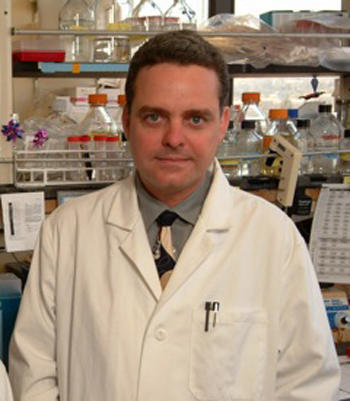Grantee Spotlight: Manuel L. Penichet, M.D., Ph.D. - Reprogramming the Immune System to Kill Cancer
, by CRCHD Staff
Dr. Manuel L. Penichet’s journey through the galaxy of the human body’s immune system orbits around the research and development of what he one day hopes will lead to new cancer treatments. He is aiming to genetically engineer antibodies, that can be used to directly target and eliminate cancer cells and also stimulate the body’s immune system to act on its own to fight and destroy cancer.
Penichet, a former CRCHD CURE Career Development Award (K01) trainee and NCI R01 grantee, is a Professor of Surgery, Microbiology, Immunology, and Molecular Genetics at the University of California in Los Angeles (UCLA).
One of the research projects that Penichet is focused on is targeting TfR1 as a potential therapy for treating multiple myeloma, a cancer that starts in the plasma cells of the bone marrow. TfR1 is a cell-surface receptor involves in iron uptake into cells and is critical for cancer cell survival. In hematological cancers such as multiple myeloma, TfR1 is overexpressed, making it an excellent target for antibodies developed by Penichet’s team, which can destroy tumors by apoptosis (programmed cell death) plus other mechanisms of action. In a different project related to multiple myeloma, Penichet plans to investigate why this malignancy disproportionately affects African Americans.
A second area of study for Penichet is the cutting-edge field of AllergoOncology, where he is investigating the role of IgE-mediated immune responses in destroying cancer cells and aiming to develop novel IgE-based cancer treatments for breast and prostate cancers, targeting the tumor molecules HER2/neu and PSA respectively. IgE is a naturally occurring antibody capable of targeting environmental molecules like pollen and dust mites, causing an allergic reaction. However, the allergic reaction can be re-directed to fight tumors if the IgE antibody is engineered to target tumor molecules as demonstrated by Penichet’s team.
A third area of research interest for Penichet involves the development of antibodies genetically fused to immunostimulatory molecules, such as cytokines. These target the tumor molecule HER2/neu, and are being investigated as potential anti-tumor agents against breast cancer. The goal is to concentrate the cytokine in the tumor microenvironment and increase the tumor-killing effect of the antibody and also activate a secondary anti-tumor immune response. Penichet has also expanded this work into nanomedicine; by combining these fusion molecules with nanopolymers, he hopes to be able to further enhance the anti-tumor activity.
“The implications of these three areas of study are far-reaching in terms of translational potential,” says Penichet.
“Medicine and biomedical research was always the love of my life,” says the Cuban-born Penichet who comes from a family of physicians. Penichet earned both his M.D. and Ph.D. degrees in biochemistry from the Havana Advanced Institute of Medical Sciences. He continued his work on a postdoctoral fellowship at the Institute of Genetics, Biochemistry, and Evolution in Pavia, Italy.
Despite the allure of cancer research, Penichet often reminds younger scientists how painstakingly difficult research can be. “Most of the time experiments don’t work the way you wish,” he says. “Sometimes the results may be negative or you may find adverse effects. But failures are still important because you learn how molecules work and it helps you move molecular research from the bench to clinical trials.”
Penichet, who has been awarded nearly 20 grants, says it’s becoming increasingly difficult to get federal, state, and foundations funding. “My entire laboratory is supported by grants and fellowships. Without it, my research could not continue.”
But Penichet’s lab is not just a place where he conducts his research; it’s also a training ground where undergraduates, graduates, postdoctoral fellows, and junior investigators can advance their skills. When minority students ask for Penichet’s advice, he always leads with the words “Persistence, persistence, persistence.” “Never allow yourself to think for one moment that you can’t accomplish your goal,” he tells his students.
Penichet is the author of more than 85 publications and holds four U.S. patents in cancer therapeutics.
